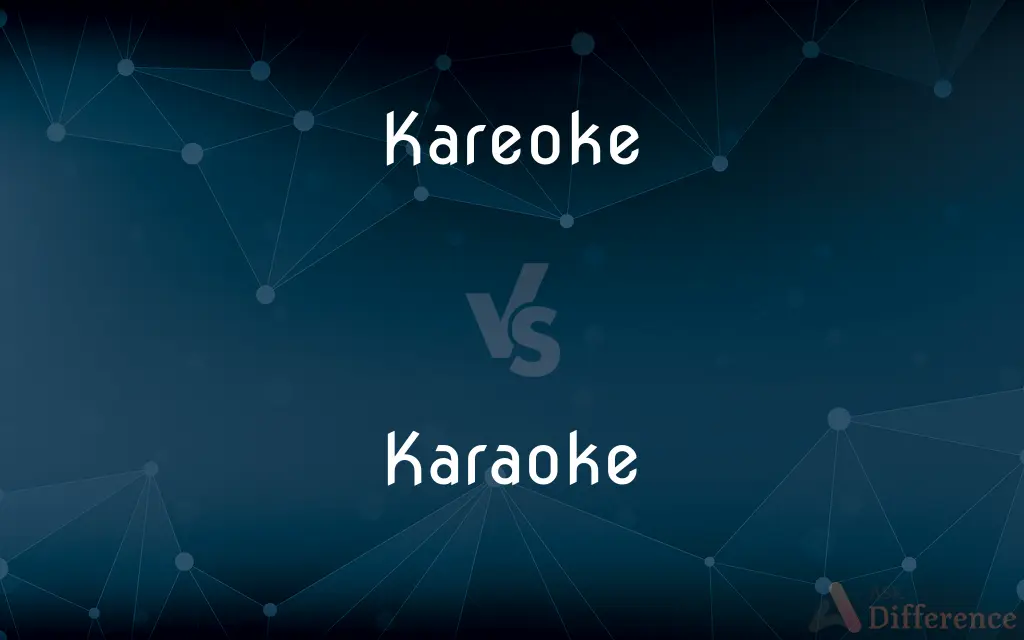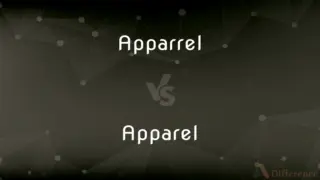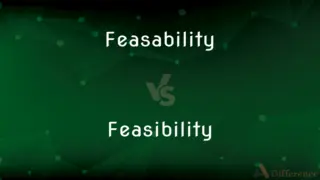Kareoke vs. Karaoke — Which is Correct Spelling?
By Tayyaba Rehman — Updated on March 30, 2024
"Kareoke" is an incorrect spelling. The correct spelling is "Karaoke," a form of entertainment where individuals sing along to recorded music.

Table of Contents
Which is correct: Kareoke or Karaoke
How to spell Karaoke?

Kareoke
Incorrect Spelling

Karaoke
Correct Spelling
ADVERTISEMENT
Key Differences
Remember the middle "a" by associating it with "a song."
The word "oak" is inside "Karaoke."
Visualize a karaoke machine, and imagine the spelling on it.
Karaoke is pronounced kara-oke, where "kara" sounds similar to "carry a song."
Think of "Karate" (a known word) and then replace the "te" with "oke."
ADVERTISEMENT
How Do You Spell Karaoke Correctly?
Incorrect: We went to a kareoke bar last night.
Correct: We went to a karaoke bar last night.
Incorrect: She loves singing kareoke with her friends.
Correct: She loves singing karaoke with her friends.
Incorrect: The hotel offers kareoke nights every Friday.
Correct: The hotel offers karaoke nights every Friday.
Incorrect: Can you recommend any good kareoke songs?
Correct: Can you recommend any good karaoke songs?
Incorrect: He bought a kareoke machine for his birthday party.
Correct: He bought a karaoke machine for his birthday party.
Karaoke Definitions
Karaoke machines play instrumental versions of popular songs.
Their home has a karaoke machine for parties.
Karaoke stems from Japanese culture, gaining worldwide popularity.
Karaoke bars are prevalent in many parts of Asia.
Karaoke often uses a microphone and displayed lyrics.
She nervously picked up the karaoke microphone.
Karaoke is a popular interactive entertainment where individuals sing with prerecorded music.
The bar hosts a Karaoke night every Friday.
Karaoke allows amateur singers to perform like professionals.
He unleashed his inner rockstar during the Karaoke session.
A music entertainment system providing prerecorded accompaniment to popular songs that a performer sings live, usually by following the words on a video screen.
The performance of such music.
(uncountable) A form of entertainment popular in clubs, at parties, etc, in which individual members of the public sing along to pre-recorded instrumental versions of popular songs, the lyrics of which are displayed for the singer on a screen in time with the music.
(countable) A karaoke session.
(countable) A karaoke parlour.
(intransitive) to perform karaoke
Singing popular songs accompanied by a recording of an orchestra (usually in bars or nightclubs)
Karaoke Meaning in a Sentence
The karaoke machine displayed the lyrics on the screen.
Many people enjoy karaoke because it allows them to perform their favorite songs.
Karaoke contests are a fun way to showcase singing talents.
She has an extensive collection of karaoke tracks at home.
Karaoke is a popular form of entertainment where people sing along to music tracks.
Some karaoke systems rate your singing performance.
The best karaoke songs are the ones that everyone knows and can sing along to.
They rented a private karaoke room to celebrate her birthday.
Karaoke is a good way to break the ice at gatherings and events.
Karaoke has evolved from simple sing-along tracks to sophisticated entertainment systems with scoring and competitions.
Going to karaoke bars is a popular activity for night outs and parties.
Karaoke can be found in many cultures around the world, each with its unique style.
Karaoke is not just about singing well; it's about having fun and being expressive.
Some people prefer singing karaoke in a private setting, while others enjoy the public stage.
She surprised everyone with her amazing voice at the karaoke bar.
A duet karaoke song can be a fun experience for couples or friends.
He was nervous at first, but he ended up enjoying karaoke night.
The karaoke session brought everyone closer together.
Karaoke bars often have theme nights, featuring songs from specific decades or artists.
Singing karaoke can be a great way to practice your vocal skills.
Karaoke nights are a good opportunity to discover new music through other people's choices.
Professional karaoke systems offer high-quality sound and a wide range of song choices.
Hosting a karaoke party at home is a fun idea for celebrations.
You can find karaoke versions of almost any song online.
There are mobile apps that turn your phone into a karaoke machine.
Karaoke Idioms & Phrases
Karaoke night
A special event or evening where people gather to sing karaoke.
The community center holds a karaoke night every month to bring residents together.
Karaoke marathon
An event where karaoke continues for an extended period, often for several hours.
They hosted a karaoke marathon to raise money for charity, singing from dusk till dawn.
Karaoke battle
A competitive event where individuals or teams compete against each other by singing karaoke.
The annual karaoke battle drew participants from all over the city, each hoping to win the trophy.
Karaoke king/queen
A person who is exceptionally good or enthusiastic about singing karaoke.
With her amazing performances, she quickly became known as the karaoke queen of the local bars.
Common Curiosities
Which vowel is used before Karaoke?
The vowel "a" is used as in "a Karaoke session."
What is the verb form of Karaoke?
The activity can be referred to as "karaokeing," but it's not a standard term.
What is the singular form of Karaoke?
The singular form is "Karaoke."
What is the plural form of Karaoke?
The plural form is "Karaokes."
Why is it called Karaoke?
It's a Japanese term where "kara" means "empty" and "oke" is short for "okesutora," meaning "orchestra."
What is the pronunciation of Karaoke?
Karaoke is pronounced as /ˌkæriˈoʊki/.
Which preposition is used with Karaoke?
"At" can be used as in "singing at karaoke."
Is Karaoke an adverb?
No, "Karaoke" is not an adverb.
What is the root word of Karaoke?
It derives from two Japanese words: "kara" (empty) and "okesutora" (orchestra).
Is Karaoke a noun or adjective?
"Karaoke" is primarily a noun.
Is Karaoke a countable noun?
Yes, you can have one karaoke machine or several karaoke sessions.
Is Karaoke a collective noun?
No, "Karaoke" is not a collective noun.
How many syllables are in Karaoke?
"Karaoke" has four syllables.
Which conjunction is used with Karaoke?
Any conjunction can be used depending on the sentence's context.
Which article is used with Karaoke?
Both "a" and "the" can be used depending on context, e.g., "a karaoke night" or "the karaoke machine."
Is Karaoke a vowel or consonant?
"Karaoke" is a word that contains both vowels and consonants.
Is the word Karaoke imperative?
No, "Karaoke" is not imperative.
What part of speech is Karaoke?
"Karaoke" is a noun.
Is the Karaoke term a metaphor?
No, "Karaoke" is not typically used as a metaphor.
Which determiner is used with Karaoke?
Determiners like "this," "that," "my," "our" can be used depending on the context.
What is the first form of Karaoke?
The base form is "Karaoke."
What is the second form of Karaoke?
Karaoke doesn't change in different tenses, so it remains "Karaoke."
What is the third form of Karaoke?
Again, it remains "Karaoke."
Is Karaoke a negative or positive word?
It's neutral but can have a positive connotation in contexts of fun and entertainment.
How do we divide Karaoke into syllables?
It's divided as: ka-ra-o-ke.
What is a stressed syllable in Karaoke?
The stressed syllable is "o" as in ka-ra-O-ke.
What is another term for Karaoke?
Sing-along or vocal mimicry.
Is Karaoke an abstract noun?
No, it's a concrete noun.
What is the opposite of Karaoke?
There isn't a direct opposite, but "original recording" or "live performance" could contrast with the concept.
Share Your Discovery

Previous Comparison
Apparrel vs. Apparel
Next Comparison
Feasability vs. FeasibilityAuthor Spotlight
Written by
Tayyaba RehmanTayyaba Rehman is a distinguished writer, currently serving as a primary contributor to askdifference.com. As a researcher in semantics and etymology, Tayyaba's passion for the complexity of languages and their distinctions has found a perfect home on the platform. Tayyaba delves into the intricacies of language, distinguishing between commonly confused words and phrases, thereby providing clarity for readers worldwide.


































